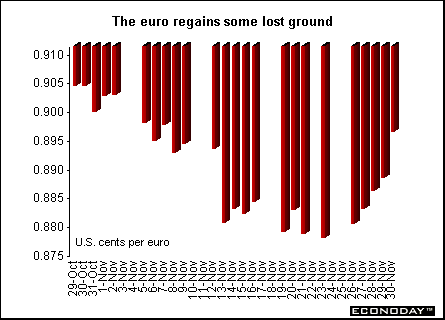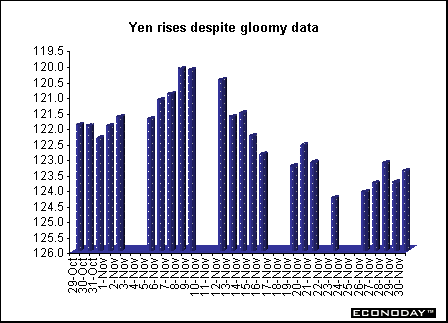 |

Currencies
The dollar had its biggest loss in a month against the euro and fell against the yen as more evidence of a weak U.S. economy boosted speculation growth will arrive later than expected. Disappointing economic indicators from revised GDP to the Chicago purchasers' survey prodded traders to wonder if the market had gotten ahead of itself in terms of recovery expectations. Other bothersome evidence included a further sag in U.S. consumer confidence and central bank officials' comments suggesting more interest rate cuts may be necessary to boost the economy. However, optimism was stirred by reports showing U.S. orders for durable goods rose more in October than any other month in the past nine years and new home sales unexpectedly increased.

The euro and yen also rose on some traders' disappointment the currencies didn't weaken as expected on changes made in Morgan Stanley Capital International's global stock indexes. Many had speculated the changes would cut demand for Japanese and European equities. Morgan Stanley Capital International (MSCI) announced the changes back on October 9 effective at midnight November 30. The change increases weightings based on availability of shares, not just outstanding totals. What this implies for foreign exchange traders is a shift out of French, German and Italian, and Japanese indexes into United States, British, Australian, and Canadian ones, which in turn, would favor their respective currencies - the U.S. dollar, pound sterling and the Australian and Canadian dollar. The MSCI indexes are used as performance benchmarks by money mangers that handle about $3 trillion.
The yen isn't expected to extend its gains given more evidence of a weakening economy. Japan's jobless rate rose to 5.4 percent in October, its highest level since records began in 1953. That reinforced speculation Japan may sell yen to weaken the currency and try to pull the country out of its fourth recession in a decade. A weaker yen makes Japan's exports more competitive and boosts the earnings of companies with overseas sales. It also counteracts deflation at a time when consumer prices have fallen in Tokyo for a 27th month. In September, the Bank of Japan sold its currency in seven separate sessions to stop it from climbing.



Introduction • Global Stock Market Indexes • Recap of Global Markets • Currencies • Indicator Scoreboard

The Bottom Line • Looking Ahead
|
 |